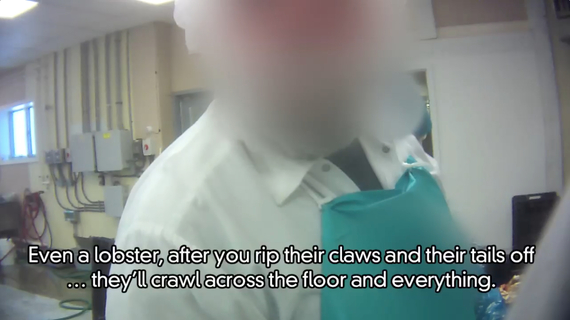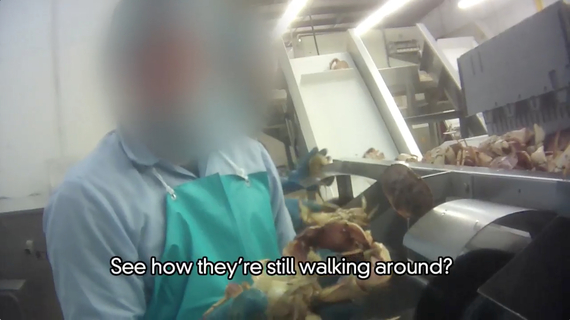As a vegan and animal rights advocate for more than 20 years, I'm astonished by how mainstream vegan eating has become these days. Ten years ago, many people still thought a "vegan" was someone from Las Vegas. Today, some of the world's biggest power players are trending vegan. Bill Gates and Twitter co-founders Evan Williams and Biz Stone, for example, are backing Beyond Meat, whose vegan mock meats taste like the real thing but don't wreak havoc on the environment the way that meat production does. You can walk into almost any supermarket and find Gardein chick'n filets, Silk almond milk, and Daiya cheddar slices, and popular restaurant chains such as Chipotle offer a variety of vegan menu items for customers who are looking for health-, animal-, and Earth-friendly food.
But even with so much awareness about where our food comes from and how it is produced, I've found that there are still many misconceptions about sea animals. Too many people still think of lobsters, fish, and other sea dwellers as little more than swimming vegetables -- if they think of them at all. Maybe it's because sea animals seem so unlike us. People who wouldn't dream of eating a pig who spent her whole life confined to a gestation crate or a chicken who lived mired in her own waste, with no room even to spread her wings, think it's somehow ok to eat a lobster or a crab. I hope that PETA's groundbreaking undercover investigation inside a crustacean slaughterhouse will make consumers realize that it isn't ok.
Earlier this year, PETA captured video footage inside Linda Bean's Maine Lobster, a Rockland, Maine, crustacean slaughterhouse that supplies retailers across the country. We found that lobsters in this slaughterhouse are decapitated, torn apart and left to die slowly and in agony. The lobsters' heads, violently ripped from their bodies, are tossed onto a conveyor belt and dropped into bins -- where their antennae continue to move long after their bodies have been mutilated. Our video footage shows workers slamming live crabs' faces onto spikes to break off their top shells and pressing the animals' exposed organs and flesh against stiff, spinning bristles to remove them. The crabs are then dropped into boiling water -- while they're still alive and completely aware.
We've known that crustaceans may feel pain since at least 2009, when Dr. Robert W. Elwood, a professor of animal behavior at Queen's University Belfast, published papers on this issue in the journals Animal Behavior and Applied Animal Behavior Science.
Lobsters do not have a centralized nervous system but instead have ganglia, or masses of nerve tissue, spread throughout their bodies, so they do not die quickly, even if their brains are destroyed. Studies have found that a lobster's nervous system continues to function even after the animal has been dismembered.
Live dismemberment of these animals is not simply cruel -- it's illegal. Maine's cruelty-to-animals statute has, for 40 years, applied to all sentient animals -- including complex lobsters and crabs, who absolutely feel pain and should be protected from such egregious cruelty.
PETA submitted a criminal complaint, along with the disturbing video footage recorded during our investigation, to the Rockland Police Department and asked Knox County District Attorney Geoffrey Rushlau to investigate and file appropriate charges against Bean under Maine's cruelty-to-animals statute. Although Rushlau declined, we disagree with his decision not to prosecute simply because the tortured animals happen to be invertebrates, and we've asked him to reconsider. But while we take up this issue with officials, everyone reading this post can make a difference by urging Bean to switch to less cruel slaughter methods, such as those used at Shucks Maine Lobster and Whole Foods.
As one shocked consumer wrote in an e-mail to Linda Bean after watching PETA's undercover footage: "To find out that I am supporting such inordinate cruelty to animals is disquieting to me. Don't get the wrong idea. I am a former Marine Infantry sergeant and I don't back away from a fight, but this is uncalled for."
And remember, the single most important step that you can take to ensure that these misunderstood animals do not suffer an agonizing death is to stop eating them. With so many vegan options available to us today, no animals should be killed cruelly just so that we can enjoy the fleeting taste of their flesh.
Tracy Reiman is an executive vice president with People for the Ethical Treatment of Animals; www.PETA.org. Follow her on Twitter at www.twitter.com/thetracyreiman.

